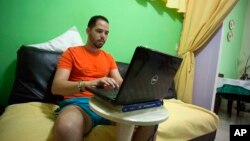Cuba is protesting the creation of a U.S. task force on increasing internet access on the island - a measure that's part of President Donald Trump's hardening of U.S. policy on Cuba.
The new policy Trump outlined in June requires the creation of a task force “to examine the technological challenges and opportunities for expanding internet access in Cuba,” including federal funding for independent media and “internet freedom.” The task force will hold its first meeting in Washington on February 7. The U.S. has not released a list of task force members or any other details of its work.
Cuba said late Wednesday that it delivered diplomatic notes of protest to the top U.S. diplomat in Havana and to the State Department in Washington.
The notes “rejected the goal of manipulating the internet to bring about illegal programs with subversive political ends,” the Cuban Foreign Ministry said.
The ministry said it “reiterated the Cuban government's determination to not tolerate any type of subversive activity or interference in its internal affairs.”
U.S. attempts to increase Cubans' access to information have been the source of extreme tension between the two governments in recent years. U.S. contractor Alan Gross was imprisoned for five years in Cuba for bringing illegal satellite equipment into the country on behalf of the U.S. Agency for International Development. His release was part of the deal that led to the reestablishment of diplomatic relations between the U.S. and Cuba and a broader move toward normalization by Presidents Barack Obama and Raul Castro.
USAID also sponsored the creation of a text-messaging-based, Twitter-like Cuban social network called ZunZuneo that was meant to morph into a platform for political organizing and potential unrest.
Internet access was rare and prohibitively expensive before the start of normalization but access has spread dramatically and dropped in price since Obama’s and Castro's 2014 deal. There are 508 public WiFi access points across the country and Cuba has begun providing home internet access in cities across the country. The government also says it will begin offering mobile internet access this year.
An hour of internet access costs $1, prohibitively expensive for many but cheap enough to allow hundreds of thousands of Cubans a year for get online.
The Cuban internet is mostly uncensored. The state blocks some sites, particularly those that receive U.S. funding such as the Marti television network, but those sites' channels can be freely accessed through third parties like Facebook and YouTube.
The Cuban government's main U.S. partner on internet access has been Google, which struck a deal to place its own servers on the island to host YouTube content, making the videos stream faster for Cubans. Google continues to work with Cuba despite Trump's hardening of U.S. policy.




